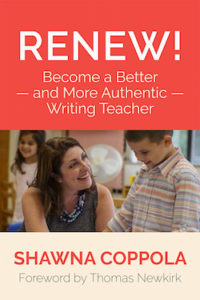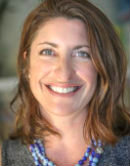Rethink First-Day Writing to Better Engage Kids
In his book Show Your Work! 10 Ways to Share Your Creativity and Get Discovered, artist and bestselling author Austin Kleon writes that “the world is changing at such a rapid rate that it’s turning us all into amateurs.” He goes on to note that “the best way to flourish is to retain an amateur’s spirit and [to] embrace uncertainty and the unknown.”
This is in direct contrast to the messages we send to classroom teachers, who are often evaluated by the level of “mastery” they’ve demonstrated in a variety of domains.
While we do, of course, want those who are directly responsible for the education of children to be effective at what they do, I believe this idea that some of us are “master” teachers and others are – what, exactly, I’m not sure – leads to the kind of fixed mindset that we claim to abhor in our students.

Instead of viewing our acquisition of professional knowledge as some sort of linear process that might someday lead to the ever-abstract concept of “mastery,” what if we educators did what Kleon suggests – what if we embraced the unknown – and viewed reflection as an opportunity, as a bloom of possibility?
A framework for renewing our practice
In my work with fellow educators, I encourage them to adopt this type of mindset by offering a simple but effective framework for reflection. In this framework, reflection is about rethinking, revising, and renewing our teaching – a process that allows us to look critically at some of the more pervasive practices that exist in our classrooms.
While engaging in this framework, some questions we might ask ourselves include:
- What “story” does our practice tell students about writing? About themselves as writers?
- What merit does it have? How does it fit into what we know about children? About learning?
- Does this match my current students’ needs and interests?
- How can we modify or revise our practice in order to tell a more authentic, more engaging, and/or more powerful story about writing?
Putting this framework to use
Let’s take the fairly common practice of starting our year in writer’s workshop by directing our students to write personal narratives. (SHOCKING CONFESSION: as a classroom teacher, I did this myself for almost a decade straight.) What story might doing this each year tell students about writing – and/or about themselves as writers?
Having engaged in this discussion with several different groups of teachers, these are some of the potential stories that students might take away from this “forced” choice:
- Personal narrative writing is the most important kind of writing (because it comes first in the year).
- Personal narrative writing is the easiest kind of writing to do (because we start with the easiest things).
- Students are not trusted to choose for themselves what type of writing they will compose at the beginning of the year.
- Narrative, expository, and persuasive forms of writing are mutually exclusive from one another. (HINT: They’re not. Thomas Newkirk’s book Minds Made for Stories: How We Really Read and Write Informational and Persuasive Texts (2014) expounds upon this idea beautifully.)
It’s always important to avoid throwing the baby out with the bathwater (as we are wont to do in education), so necessarily we must ask: Why might we choose to begin each year in writer’s workshop with a unit on personal narrative writing? What merit does this have? Is it a good choice?
To begin, personal narrative writing certainly seems developmentally appropriate, particularly for girls and particularly during their earliest years of schooling. In fact, given the choice, many, if not most, kindergarten students will draw/write about their own personal experiences (e.g., “My Family”) before attempting any other kind of writing (although I would argue this may be more likely due to the implicit and explicit messages we send students about what “counts” as writing, even from the very beginning of their schooling).
Second, if we were to think back to our own experiences as writers in both elementary and middle school, most of us were encouraged by our teachers, over and over again, to “write what [we] know.” Personal narrative certainly allows us to do this.
However, let’s take a moment to push back on these ideas. The notion that most of our earliest writers would choose to write about their real lives before anything else negates the piles and piles of writing about rainbows, Star Wars, Pokémon, trucks, and Minecraft that we see children produce both in and out of classrooms each fall.
In addition, that ubiquitous piece of writerly advice, “Write what you know,” severely limits students’ compositional possibilities while also failing to take into account the extraordinary value of writing to think, to discover, and to figure out what, in fact, one does know.
Furthermore, focusing so early (and so often) on this particular genre of writing throughout students’ elementary and middle school years may be insensitive to those students for whom life may not be filled to the brim with fun adventures and profound experiences – or for whom too much introspective writing may prove uncomfortable (or worse, traumatic).
More authentic and engaging experiences
Instead of launching each year of writer’s workshop with a personal narrative unit (or any overly planned unit, for that matter), how might we revise our practice to make students’ first writing experience of the school year more authentic and engaging?
Perhaps we might use the first writing unit of the year, as several teachers do, to assess what students’ needs, interests, and compositional strengths are by having them compose something of their own choosing.

Or, what if they took the advice of author-educator Aimee Buckner (whose book Notebook Know-How: Strategies for the Writer’s Notebook is an invaluable resource) and helped students develop a toolbox of ways that they might develop “seed” ideas for their own writing notebook?
Maybe if, instead of limiting students to writing within the more narrow personal narrative/memoir genre, teachers invited them to explore narrative in general – what it is, what it isn’t, and where one might find it “in the wild.”
Think about what the stories emerging from any one of these launch units would tell students about writing and/or about themselves as writers – and how much more engaging and powerful those stories would be.
Renewing our professional lives
Let’s face it – the majority of educators became educators, in part, because they themselves were “good” at school. For those who’ve almost always excelled at school-like tasks, it can be difficult – terrifying, even – to “embrace uncertainty” as a classroom teacher. But just as water needs movement and change to avoid becoming stagnant, so do our practices.
In my debut book from Stenhouse Publishers, Renew! Become a Better – and More Authentic –Writing Teacher (2017), I invite my literacy colleagues to join me in using a framework of rethinking and revising to open up new worlds of possibility for our student writers – and to renew our own professional lives in the process. Is this an invitation you’re ready to accept?


































Well argued, Shawna. Throughout their lives, our students will often need to write personal narratives, but rarely will they need to pick the topic out of the air.
I discovered in my first semester college composition class that the opening week personal narrative assignment was the reason nearly every one of my male students hated writing. They saw it as too personal, too revealing, too emotional.
I substituted an assignment in which everyone was to introduce themselves using the opening, “I’m [name] and I’m a writer.” (I discuss the assignment on my blog: “Purposeful Opening Day Introductions.”)
The “I’m a writer” assignment was a success with the guys, and it had the unexpected bonus of teaching everyone that they could use their experience to support a position.